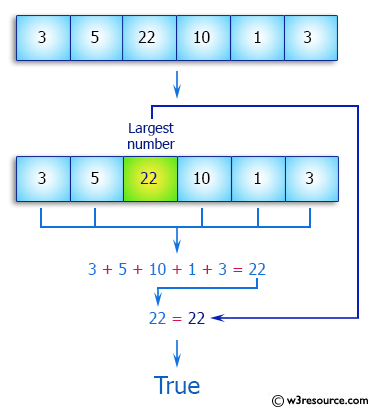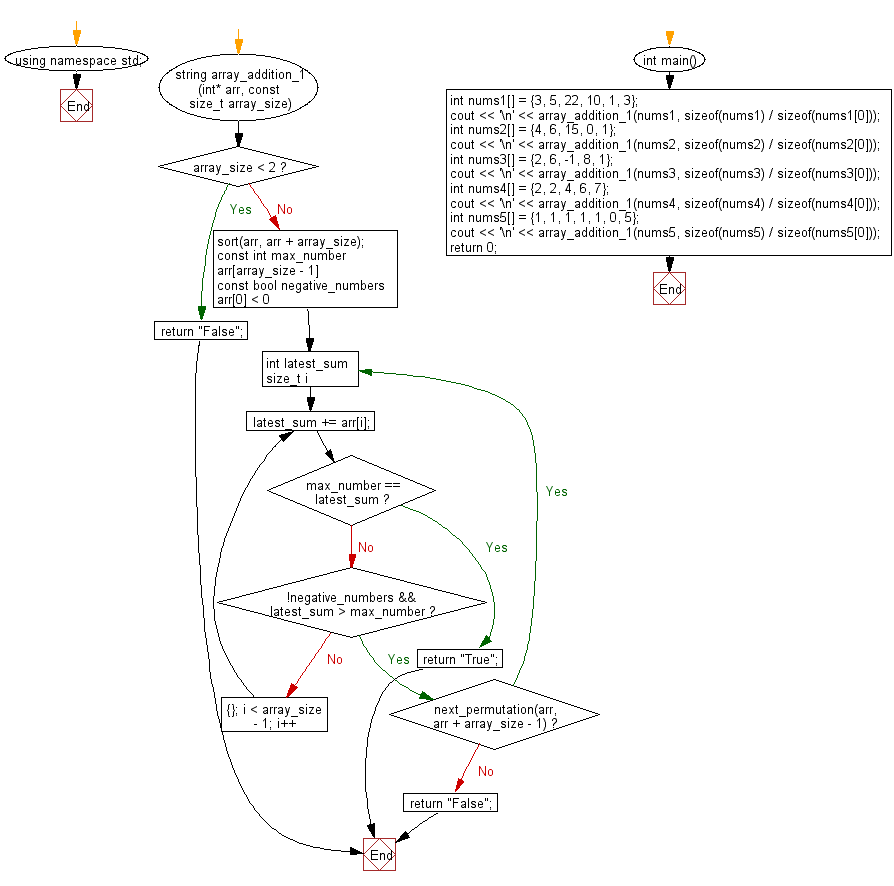C++ Exercises: Arrange the numbers of a given array in a way that the sum of some numbers equal the largest number in the array
28. Arrange Numbers so that Sum of Some Equals Largest Number
Write a C++ program to arrange the numbers in a given array in a way that the sum of some numbers equals the largest number in the array.
Visual Presentation:

Sample Solution:
C++ Code :
#include <iostream> // Header file for input/output stream
#include <algorithm> // Header file for algorithms
#include <string> // Header file for string operations
using namespace std; // Using the standard namespace
// Function to determine if a subset of array elements sum up to the maximum number in the array
string array_addition_1(int* arr, const size_t array_size) {
// If the array size is less than 2, return "False"
if (array_size < 2)
return "False";
// Sort the array elements in ascending order
sort(arr, arr + array_size);
// Get the maximum number from the array
const int max_number{ arr[array_size - 1] };
// Check if the array contains negative numbers
const bool negative_numbers{ arr[0] < 0 };
do {
int latest_sum{}; // Variable to store the running sum of array elements
// Loop through the array elements to find subsets whose sum equals the maximum number
for (size_t i{}; i < array_size - 1; i++) {
latest_sum += arr[i]; // Add the current element to the running sum
// If the running sum matches the maximum number, return "True"
if (max_number == latest_sum)
return "True";
// If there are no negative numbers and the running sum exceeds the maximum number, break the loop
if (!negative_numbers && latest_sum > max_number)
break;
}
} while (next_permutation(arr, arr + array_size - 1)); // Generate permutations of the array
return "False"; // Return "False" if no subset found with sum equal to the maximum number
}
int main() {
// Declaration and initialization of arrays
int nums1[] = {3, 5, 22, 10, 1, 3};
cout << '\n' << array_addition_1(nums1, sizeof(nums1) / sizeof(nums1[0])); // Expected output: "true" 3 + 5 + 10 + 1 + 3 = 22
int nums2[] = {4, 6, 15, 0, 1};
cout << '\n' << array_addition_1(nums2, sizeof(nums2) / sizeof(nums2[0])); // Expected output: "false"
int nums3[] = {2, 6, -1, 8, 1};
cout << '\n' << array_addition_1(nums3, sizeof(nums3) / sizeof(nums3[0])); // Expected output: "true" 2 + 6 - 1 + 1 = 8
int nums4[] = {2, 2, 4, 6, 7};
cout << '\n' << array_addition_1(nums4, sizeof(nums4) / sizeof(nums4[0])); // Expected output: "false"
int nums5[] = {1, 1, 1, 1, 1, 0, 5};
cout << '\n' << array_addition_1(nums5, sizeof(nums5) / sizeof(nums5[0])); // Expected output: "true" 1 + 1 + 1 + 1 + 1 = 5
return 0; // Return 0 to indicate successful execution
}
Sample Output:
True False True False True
Flowchart:

For more Practice: Solve these Related Problems:
- Write a C++ program to check if an array can be partitioned so that the sum of a subset equals the largest element.
- Write a C++ program that reads an array and determines whether the largest number is equal to the sum of a selection of other elements.
- Write a C++ program to solve a subset sum problem where the target is the maximum element in the array.
- Write a C++ program to verify if an array can be rearranged such that a group of elements sums exactly to the largest number.
Go to:
PREV : Count Pairs with Sum Equal to Specified Number.
NEXT : Second Lowest and Highest Numbers in Array.
C++ Code Editor:
Contribute your code and comments through Disqus.
What is the difficulty level of this exercise?
Test your Programming skills with w3resource's quiz.
